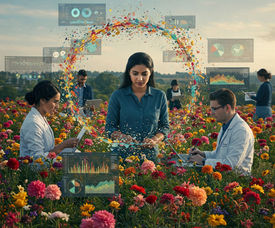Benefits of Using AI in Everyday Life: A Comprehensive Look
- Tretyak
- Mar 5, 2024
- 11 min read
Updated: Mar 4
Artificial Intelligence (AI) is no longer a futuristic fantasy; it's woven into the fabric of our daily routines, quietly enhancing our lives in countless ways. From the moment our AI-powered alarm clocks gently rouse us from sleep, analyzing our sleep patterns to determine the optimal wake-up time, to the personalized recommendations we receive on our favorite streaming services, AI is working tirelessly to make our lives easier, more efficient, and more enjoyable. Let's embark on a comprehensive deep dive into the myriad benefits of using AI in everyday life, exploring how this transformative technology is reshaping our experiences and empowering us to achieve more.
1. Enhanced Productivity and Efficiency
AI is like a tireless assistant, automating mundane tasks, streamlining complex processes, and optimizing our time and resources, allowing us to focus on what truly matters and achieve more with less effort.
Automated Task Management and Intelligent Assistance:
AI-powered virtual assistants, smart home devices, and productivity apps automate a wide range of routine tasks, from scheduling appointments and setting reminders to managing emails, filtering spam, and even ordering groceries based on our consumption patterns.
This frees up our time and mental bandwidth, allowing us to focus on more creative, strategic, and meaningful endeavors, whether it's pursuing our passions, spending time with loved ones, or tackling complex challenges at work.
AI-powered tools can also provide intelligent assistance, anticipating our needs and proactively offering solutions, such as suggesting relevant documents for a meeting or reminding us to take an umbrella if it's raining.
Streamlined Workflows and Process Optimization:
AI is optimizing workflows and processes in various industries, from manufacturing and logistics to healthcare and finance, by analyzing data to identify bottlenecks, inefficiencies, and opportunities for improvement.
This leads to increased efficiency, reduced errors, and improved productivity, benefiting both businesses and consumers.
In manufacturing, for example, AI-powered robots can automate repetitive tasks, improving production speed and quality, while in logistics, AI algorithms can optimize delivery routes and schedules, reducing transportation costs and delivery times.
Personalized Recommendations and Data-Driven Decision Support:
AI algorithms analyze vast amounts of data to provide personalized recommendations and decision support, helping us make informed choices in various aspects of our lives.
In healthcare, AI can analyze patient data to recommend personalized treatment plans, while in education, AI can suggest personalized learning resources based on individual student needs and learning styles.
AI can also help us make informed financial decisions by analyzing market trends and providing personalized investment advice.
Improved Time Management and Optimized Scheduling:
AI-powered tools can help us manage our time more effectively, identifying time-wasting activities, prioritizing tasks, and optimizing our schedules based on our individual goals and priorities.
This allows us to accomplish more in less time, reducing stress and increasing overall productivity.
AI can also help us schedule meetings, coordinate travel plans, and manage our calendars, ensuring that we make the most of our time.
2. Enhanced Convenience and Personalization
AI is like a personal concierge, tailoring experiences to our individual needs and preferences, anticipating our desires, and creating a world that feels custom-made just for us.
Personalized Recommendations and Content Curation:
AI algorithms analyze our past behavior, preferences, and context to provide personalized recommendations for products, services, and content, from movies and music to books and news articles.
This helps us discover new things we might enjoy, avoid wasting time on irrelevant information, and make choices that align with our individual needs and goals.
AI-powered recommendation systems are used by streaming services, online retailers, and social media platforms to provide us with a curated feed of content that is relevant to our interests.
Customized Experiences and Adaptive Interfaces:
AI is personalizing our experiences in various domains, from entertainment and shopping to education and healthcare, by adapting interfaces, content, and interactions to our individual preferences and needs.
AI-powered adaptive learning platforms, for example, tailor educational content to individual learning styles and pace, while AI-powered healthcare systems provide personalized treatment plans based on individual patient characteristics.
AI can also personalize our online shopping experiences by recommending products based on our browsing history, purchase history, and even our current location.
Smart Home Automation and Personalized Comfort:
AI-powered smart home devices automate various tasks, such as adjusting lighting, controlling temperature, managing security systems, and playing music, creating a comfortable and convenient living environment that adapts to our needs and preferences.
Imagine waking up to your favorite music playing softly, the lights gradually brightening, and the coffee maker brewing a fresh pot, all orchestrated by your AI-powered smart home system.
AI can also learn our preferences over time, adjusting the temperature and lighting automatically based on our habits and routines.
Voice-Controlled Assistants and Natural Language Interaction:
AI-powered voice assistants, such as Alexa and Google Assistant, provide a hands-free and intuitive way to interact with technology, allowing us to control devices, access information, and perform tasks with simple voice commands.
We can ask our voice assistants to play music, set reminders, make calls, send messages, and even control our smart home devices, all without lifting a finger.
AI is constantly improving its natural language processing capabilities, making interactions with voice assistants more conversational and natural.
3. Improved Safety and Security
AI is like a vigilant guardian, constantly monitoring our surroundings, detecting potential threats, and taking proactive measures to protect us from harm, both in the physical and digital worlds.
Smart Home Security and Proactive Threat Detection:
AI-powered security systems can analyze video feeds from security cameras to detect suspicious activity, such as someone lurking around our property or attempting to break in.
They can also monitor for safety hazards, such as smoke, fire, or carbon monoxide, and alert us and authorities in case of emergencies.
AI can even learn our routines and identify anomalies, such as a door being left open or a window being broken at an unusual time, providing an extra layer of protection.
Autonomous Vehicles and Enhanced Road Safety:
AI is powering the development of autonomous vehicles, which have the potential to significantly reduce traffic accidents and improve road safety by eliminating human error, a major cause of accidents.
AI-powered vehicles can analyze their surroundings in real-time, detect potential hazards, and make split-second decisions to avoid collisions.
They can also optimize routes and traffic flow, reducing congestion and improving fuel efficiency.
Fraud Detection and Prevention:
AI algorithms can analyze patterns and anomalies in financial transactions to identify and prevent fraudulent activities, such as credit card fraud, identity theft, and phishing scams.
This protects us from financial losses and helps maintain the integrity of the financial system.
AI-powered fraud detection systems are used by banks, credit card companies, and online retailers to protect consumers and businesses from financial crime.
Cybersecurity and Threat Intelligence:
AI is being used to enhance cybersecurity by detecting and preventing cyberattacks, such as malware infections, phishing attacks, and denial-of-service attacks.
AI-powered cybersecurity systems can analyze network traffic, identify suspicious activity, and take proactive measures to protect our personal data and sensitive information.
They can also learn from past attacks to improve their ability to detect and prevent future threats.
4. Enhanced Healthcare and Well-being
AI is like a tireless medical researcher and caregiver, constantly analyzing data, developing new treatments, and providing personalized care to improve our health and well-being.
Early Disease Detection and Diagnosis:
AI algorithms can analyze medical images, such as X-rays, CT scans, and MRIs, with greater accuracy and speed than human radiologists, identifying subtle patterns and anomalies that might be missed by the human eye.
AI can also analyze patient records, genetic data, lifestyle information, and even wearable sensor data to identify diseases and predict health risks, enabling earlier diagnosis and more effective treatment.
This can lead to more personalized and proactive healthcare, where interventions are tailored to individual needs and risks, improving patient outcomes and reducing healthcare costs.
Personalized Medicine and Targeted Therapies:
AI is being used to develop personalized treatments based on a patient's individual characteristics and needs, such as their genetic makeup, lifestyle, and medical history.
This can lead to more effective and targeted therapies, with fewer side effects and better outcomes, as treatments are tailored to the specific needs of each patient.
AI can also be used to monitor patients' response to treatment and adjust medication dosages as needed, ensuring optimal efficacy and minimizing adverse reactions.
Drug Discovery and Development:
AI is accelerating the process of drug discovery by analyzing vast amounts of data to identify potential drug candidates, predict their efficacy and safety, and optimize their development.
This can lead to the development of new and innovative treatments for diseases that were previously considered incurable, offering hope to millions of patients worldwide.
AI can also be used to repurpose existing drugs for new indications, potentially saving time and resources in the drug development process.
Remote Patient Monitoring and Telehealth:
AI-powered devices and apps can monitor patients' health remotely, providing real-time data to healthcare providers, such as heart rate, blood pressure, and activity levels.
This can help to prevent hospital readmissions, improve patient outcomes, and reduce healthcare costs by enabling proactive interventions and reducing the need for in-person visits.
AI can also be used to provide personalized health recommendations and support to patients, empowering them to take control of their own health.
Mental Health Support and Companionship:
AI-powered chatbots and virtual assistants can provide mental health support and companionship, offering a safe and accessible space for people to discuss their concerns and receive guidance.
These AI-powered tools can provide personalized support, offer coping mechanisms, and even connect people with human therapists if needed.
This can be particularly helpful for people who may not have access to traditional mental health services or who feel more comfortable discussing their concerns with an AI companion.
5. Enhanced Accessibility and Inclusivity
AI is like a universal translator and bridge builder, breaking down barriers and making technology more accessible and inclusive for people with disabilities, empowering them to participate more fully in society.
Assistive Technologies and Adaptive Interfaces:
AI is powering a wide range of assistive technologies, such as screen readers, voice assistants, communication aids, and prosthetic devices, that help people with disabilities interact with technology and access information.
These technologies can adapt to individual needs and preferences, providing a personalized and empowering experience.
For example, AI-powered screen readers can adjust the speed and tone of voice based on user preferences, while AI-powered prosthetic devices can learn and adapt to individual movement patterns.
Personalized Learning and Accessible Education:
AI-powered adaptive learning platforms personalize educational content to individual learning styles and needs, making education more accessible and inclusive for students with diverse learning abilities.
These platforms can adjust the pace of learning, provide individualized support, and offer alternative modalities for accessing information, such as audio descriptions and sign language translations.
This ensures that all students have the opportunity to learn and succeed, regardless of their learning differences.
Accessibility Features in Mainstream Technologies:
AI is being used to develop accessibility features in various mainstream technologies, such as smartphones, computers, and websites, making technology more usable for people with disabilities.
These features include real-time captioning, image recognition, voice control, and text-to-speech capabilities, allowing people with disabilities to interact with technology in a way that is natural and intuitive for them.
This promotes inclusivity and ensures that everyone can benefit from the advancements in technology.
6. Environmental Sustainability
AI is like a tireless environmental advocate, constantly monitoring our planet, optimizing resource usage, and developing innovative solutions to address environmental challenges, helping us create a more sustainable future for generations to come.
Smart Energy Management and Renewable Energy Integration:
AI-powered smart grids optimize energy distribution, balancing supply and demand in real-time, reducing waste, and improving efficiency.
AI can also integrate renewable energy sources, such as solar and wind power, into the energy mix, reducing our reliance on fossil fuels and promoting a cleaner energy future.
Smart home devices can also use AI to optimize energy consumption, automatically adjusting lighting, heating, and cooling based on occupancy patterns and weather conditions.
Precision Agriculture and Sustainable Farming Practices:
AI is being used in agriculture to optimize crop yields, reduce water and fertilizer usage, and minimize the environmental impact of farming.
AI-powered sensors and drones can monitor crop health, soil conditions, and weather patterns, providing farmers with real-time data to make informed decisions about irrigation, fertilization, and pest control.
This can lead to more sustainable farming practices, reducing water and energy consumption, minimizing the use of pesticides and herbicides, and improving soil health.
Waste Management and Recycling Optimization:
AI-powered systems can optimize waste collection routes, improve recycling rates, and reduce the amount of waste sent to landfills.
AI can analyze waste composition, identify recyclable materials, and even automate the sorting process, making recycling more efficient and effective.
Smart bins can use AI to monitor fill levels and optimize collection schedules, reducing fuel consumption and emissions from garbage trucks.
Pollution Monitoring and Control:
AI can analyze environmental data from various sources, such as air quality sensors, weather stations, and satellite imagery, to identify pollution sources, predict pollution levels, and develop strategies to mitigate pollution.
This can help us improve air and water quality, protect ecosystems, and mitigate the effects of climate change.
AI can also be used to monitor and control industrial emissions, ensuring compliance with environmental regulations and promoting responsible manufacturing practices.

7. Enhanced Creativity and Innovation
AI is like a muse and collaborator, sparking our imaginations, augmenting our creative abilities, and helping us explore new frontiers of innovation in various fields, from art and music to science and engineering.
Creative Tools and AI-Generated Content:
AI-powered creative tools, such as image generators, music composers, and writing assistants, can help us explore new creative possibilities and express ourselves in new ways.
These tools can generate novel ideas, suggest alternative approaches, and even create entire works of art, music, or literature, pushing the boundaries of human creativity.
AI can also be used to personalize creative experiences, tailoring tools and content to individual preferences and styles.
Data Analysis and Pattern Recognition for Discovery:
AI algorithms can analyze vast amounts of data to identify patterns and trends that humans might miss, leading to new insights and discoveries in various fields, from science and medicine to finance and marketing.
This can help us understand complex phenomena, predict future trends, and develop innovative solutions to challenging problems.
For example, AI is being used to analyze astronomical data to discover new planets, analyze genomic data to identify disease-causing mutations, and analyze financial data to predict market trends.
Problem Solving and Optimization:
AI can be used to solve complex problems and optimize designs, leading to more efficient and innovative solutions in various fields.
In engineering, AI can be used to optimize the design of buildings, bridges, and aircraft, making them stronger, lighter, and more sustainable.
In logistics, AI can be used to optimize delivery routes and schedules, reducing transportation costs and delivery times.
Accelerated Research and Development:
AI is accelerating research and development in various fields by automating tasks, analyzing data, and generating new ideas.
This can lead to faster innovation cycles, new product development, and scientific breakthroughs.
For example, AI is being used to accelerate drug discovery, develop new materials, and design more efficient algorithms.

8. Continuous Learning and Improvement
AI is like a perpetual student, constantly learning and improving, adapting to our needs and preferences, and becoming more intelligent and capable over time, pushing the boundaries of what's possible.
Machine Learning and Adaptive Algorithms:
AI systems use machine learning algorithms to learn from data, identify patterns, and make predictions, improving their performance over time as they are exposed to more data.
This allows AI systems to adapt to changing environments, personalize experiences, and provide more accurate and relevant results.
Machine learning is used in various applications, from spam filtering and fraud detection to personalized recommendations and image recognition.
Deep Learning and Complex Pattern Recognition:
Deep learning, a subfield of machine learning, uses artificial neural networks with multiple layers to extract complex patterns from data, enabling AI systems to perform more sophisticated tasks, such as natural language processing, image recognition, and speech recognition.
Deep learning has led to significant breakthroughs in AI, enabling machines to achieve human-level performance in various tasks.
Reinforcement Learning and Autonomous Decision-Making:
Reinforcement learning allows AI systems to learn through trial and error, interacting with their environment and receiving feedback to improve their behavior.
This allows AI systems to learn complex tasks, such as playing games, controlling robots, and optimizing resource allocation, without explicit programming.
Reinforcement learning is used in various applications, from robotics and autonomous vehicles to game playing and personalized learning.
By embracing the power of AI and harnessing its potential for good, we can create a future where technology empowers us to live healthier, more productive, and more fulfilling lives. As AI continues to evolve, we can expect even more transformative benefits in the years to come, shaping a future where technology seamlessly integrates with our lives and helps us achieve our full potential.































































































This article does a great job outlining how AI is already making our lives easier and more efficient. I wasn't aware of just how many ways AI is used in healthcare and customer service – it's truly fascinating!